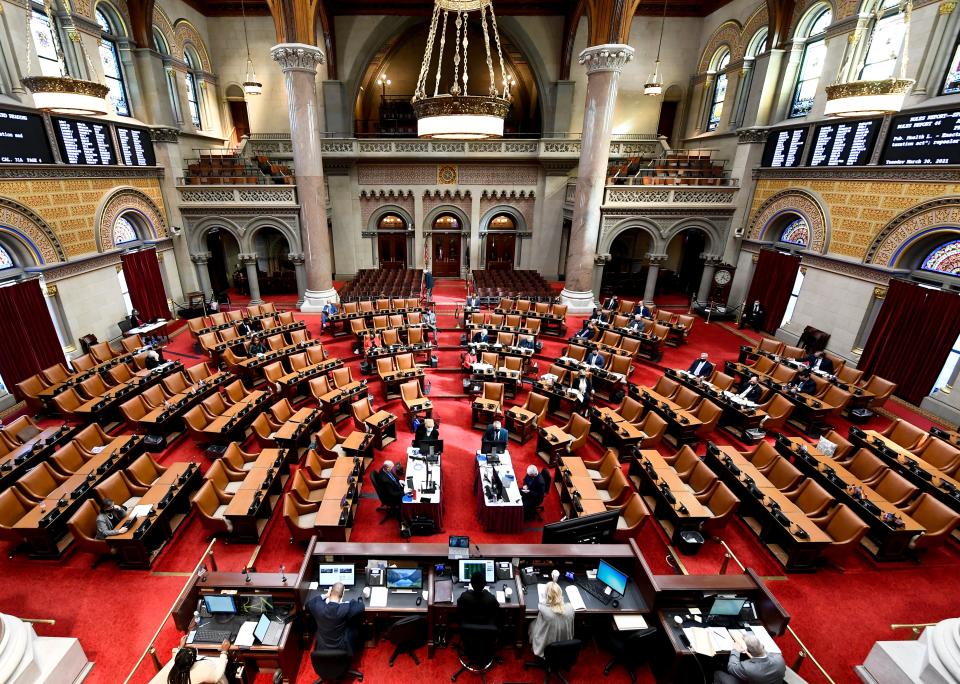We're counting on the Legislature to pass the Adult Survivors Act this session | Opinion
I have spent decades working with survivors of sexual assault. I have seen, over and over again, that there’s no “right” amount of time a survivor needs before they are able to share what has happened to them.
Yet, for decades, our laws in New York and across the nation have forced survivors to face a count-down clock or miss the chance to hold the person who hurt them accountable in court.
For many survivors, outdated statutes of limitations mean that before they are ever able to tell someone they trust about their assault, their time to seek justice has run out. Some of our laws continue to be completely out of sync with the science of trauma, and all that we know about how the brain processes it.

Our laws have long expected survivors to come forward quickly, without understanding that many survivors simply are not able to. Processing the trauma of sexual violence can take years, even decades.
Our brains do incredible things to protect us — including making it hard for us to think or talk about violence that was done against us. That makes it difficult for survivors to recall specifics, which they know they will be asked about if they report their assault.
This recent survivor account is a powerful example. Lily — not her full name — recounts being sexually assaulted by “Sex and the City” star Chris Noth. Immediately after the 2015 incident, Lily called her friend Alex and told her that Noth “pretty forcibly” had sex with her — but Lily has no memory of making that call. Alex, who was not attacked, remembers it perfectly.
That’s because traumatic memories are recorded differently than normal memories – they often are stored in our mind as nonlinear fragments or flashes. Distance from the event, therapy and other types of healing can help organize traumatic memories into more linear and coherent events, but that takes time.
From working with survivors, I know that traumatic memories don’t just play back like a video.
And I can understand why a survivor might need many, many years to sort through those memories before reporting abuse.
And then, of course, I have heard from many survivors who DID report their abuse. But because of their brain’s protective instincts, they were accused of lying or told that their story wouldn’t “hold up” enough to pursue a court case.
These survivors deserve better. And the good news is we can take a step toward giving it to them.
Opening access to civil courts would be an important step to making the justice system work for survivors — especially for those who are outside the statute of limitations.
In New York, the Child Victims Act did that for survivors of childhood sexual assault by opening a one year look back window allowing anyone to file a civil suit no matter how long ago the abuse happened.
But, for some reason I truly can’t understand, the law treats people who were assaulted as adults differently. It shouldn’t.
The Adult Survivors Act would give survivors back a chance at justice by opening a one-year lookback window in which any survivor who was over the age of 18 at the time of their abuse can file a civil case — no matter when the abuse happened. By passing the Adult Survivors Act, New York lawmakers can take a big step in helping give survivors back that time to heal and decide what accountability looks like to them.
Survivors have waited long enough for justice.
When we consider the external and internal obstacles survivors have to overcome, it’s no wonder so few survivors feel safe coming forward.
It’s time to stop asking, “Why did it take you so long to come forward?” Instead, we need to ask, “Who are our laws really protecting? And how can we change them so that survivors can begin to heal?”
The Adult Survivors Act won’t fix everything. But it will be an important step forward.
The bill passed the Senate unanimously last session but failed to make it to the floor in the Assembly. After a tumultuous year in New York’s capital New York lawmakers have a real chance to show survivors they matter.
Lawmakers must pass the Adult Survivors Act early this session.
Liz Roberts is CEO of Safe Horizon, the nation’s leading victim assistance organization, operating a network of programs across New York City communities and systems.
This article originally appeared on Rockland/Westchester Journal News: NY Adult Survivors Act must pass this session

